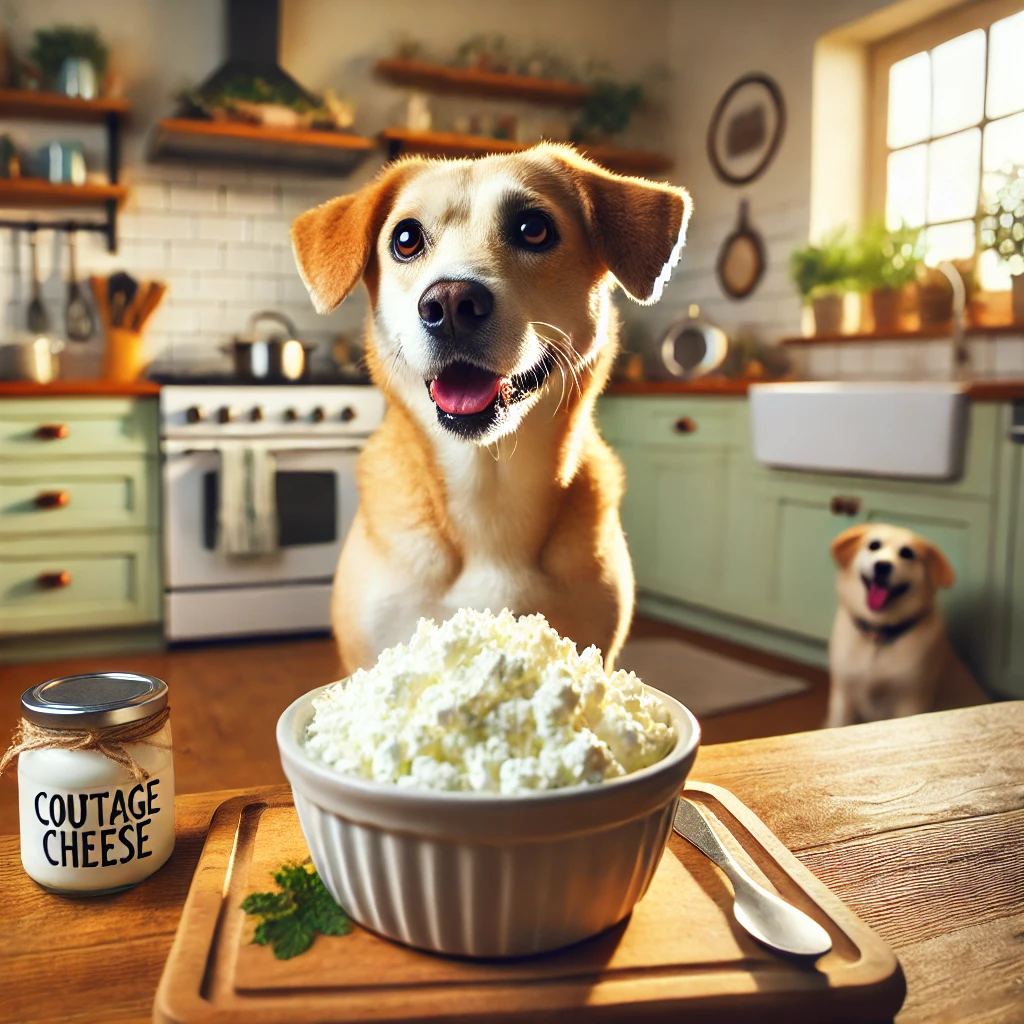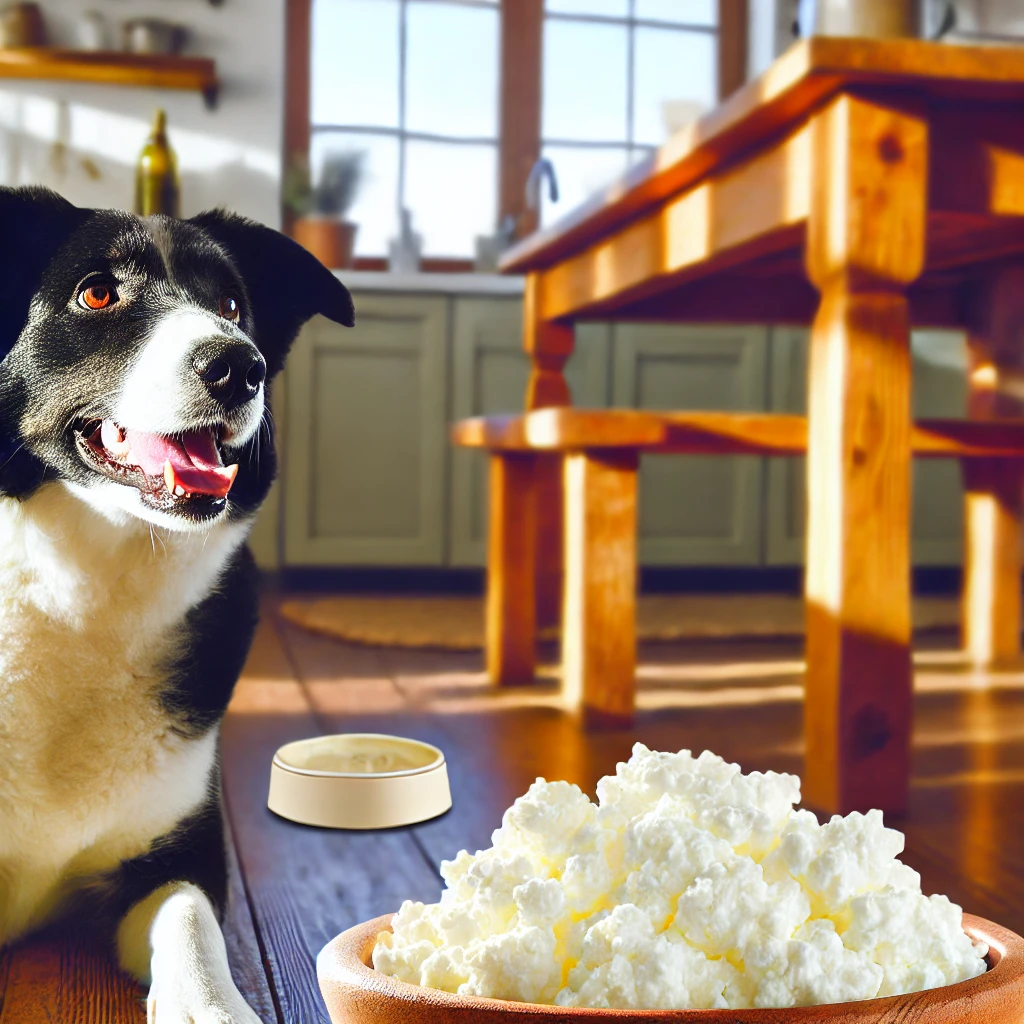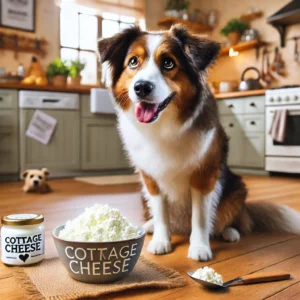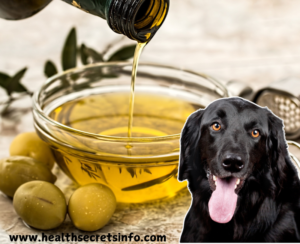Can dogs have cottage cheese? My experience and What i learned

As a dog owner, I’m always looking for ways to keep my furry friend’s diet both interesting and healthy. One of the questions I’ve come across during my dog food research is: can dogs eat cottage cheese? I’ve heard of people giving their dogs this tasty snack, but I wanted to dig deeper and find out the benefits and risks. So, after some research and talking to my vet, I’ve got a good understanding of when cottage cheese might be a good option for your pup—and when it’s better to avoid it.
Nutritional Profile of Cottage Cheese: What’s in It for Your Dog?
If you’ve ever wondered whether cottage cheese is good for dogs, you’ll be happy to know that it’s packed with nutrition. Cottage cheese is a dairy product that’s generally high in protein, vitamins, and minerals, which are all essential for your dog’s overall health. Let’s break it down.
Protein: A Must for Dogs
First and foremost, cottage cheese is a great source of protein. We all know that dogs need protein to build and repair muscle, and cottage cheese fits the bill pretty well. The protein in cottage cheese can help maintain your dog’s muscle mass, especially if your dog is active or recovering from an injury. Plus, it’s relatively easy to digest, making it a good option for dogs who might have a sensitive stomach.
Vitamins and Minerals: Supporting Strong Bones and Healthy Skin
Cottage cheese also contains some key vitamins and minerals that can benefit your dog’s health. Here’s a quick rundown of what it offers:
- Calcium: We often associate calcium with strong bones, and for good reason! Cottage cheese contains a decent amount of calcium, which supports your dog’s skeletal health. This is particularly important for growing puppies or aging dogs who may need a little extra boost for their bone health.
- Magnesium: Another mineral in cottage cheese is magnesium, which helps with heart function and muscle contraction. It’s not something we think about every day, but magnesium is vital for keeping your dog’s body functioning smoothly.
- Vitamin A: This vitamin is great for promoting healthy skin and vision, which is just as important for dogs as it is for humans.
Low Lactose Levels: A Plus for Sensitive Stomachs
One of the best things I found about cottage cheese is that it’s relatively low in lactose compared to other dairy products. Many dogs are lactose intolerant, meaning they can’t digest milk sugars very well, which can lead to upset stomachs. Because cottage cheese is lower in lactose, it’s often easier for dogs to digest, making it a safer choice for those who are a bit sensitive.
Health Benefits of Cottage Cheese for Dogs
After learning about the nutritional content, I was excited to find that cottage cheese could offer some real health benefits for dogs. Let’s explore how it could help your pup.
Weight Management: A Low-Calorie Option
If your dog is a little on the heavier side (it happens to the best of us!), cottage cheese can be a good addition to their diet. It’s low in calories and fat, which makes it a better option than some high-fat treats. You can mix a small amount of cottage cheese with your dog’s regular food to add flavor without packing on extra pounds. It can make their meal more exciting, especially for picky eaters.
Digestive Health: It’s All About the Gut
This is where cottage cheese really shines, in my opinion. Some varieties of cottage cheese contain probiotics, those good-for-you bacteria that promote gut health. If your dog has digestive issues, like occasional diarrhea or an upset stomach, the probiotics in cottage cheese can help restore balance to their digestive system.
I’ve also found that some people give their dogs cottage cheese mixed with bland foods, like rice, when they’re experiencing digestive problems. It can help soothe the stomach and provide a little nutrition without being too heavy. I’ve tried this approach myself when my dog had a mild bout of diarrhea, and it seemed to work wonders!
Supplementing Your Dog’s Diet: A Tasty Addition
Another great thing about cottage cheese is that it can be used as a supplement to your dog’s regular diet. You can add a spoonful to their kibble or wet food for an extra boost of protein and flavor. It’s a quick and easy way to make meals more interesting while also sneaking in some additional nutrients.
Safety Considerations: What You Need to Know
Of course, like anything you introduce into your dog’s diet, it’s important to be mindful of how much cottage cheese you give them. Here are a few safety tips I learned.
Moderation is Key
Cottage cheese is great, but too much of a good thing can be a problem. It’s recommended that you keep it to no more than 10% of your dog’s daily caloric intake. Giving too much dairy—even a low-lactose option like cottage cheese—can lead to digestive upset, so moderation is key. I usually start with just a small spoonful to see how my dog reacts.
Watch for Allergies or Intolerances
Even though cottage cheese is low in lactose, some dogs can still be sensitive to dairy. If you’ve never given your dog cottage cheese before, keep an eye out for signs of allergies or intolerance, like itching, vomiting, or diarrhea. If any of these symptoms show up, stop giving it immediately and consult your vet.
Health Conditions: When to Avoid Cottage Cheese
If your dog has any specific health conditions—like lactose intolerance, a dairy allergy, or certain kidney issues—cottage cheese may not be the best option. It’s always a good idea to check with your vet before adding something new to your dog’s diet, especially if they have a known medical condition.
How to Introduce Cottage Cheese to Your Dog’s Diet
If you’ve decided that cottage cheese might be a good fit for your dog, it’s important to introduce it slowly. I’ve found that starting with a small amount and gradually increasing it works best. Here are some ways you can introduce it:
Gradual Introduction
Start with a teaspoon of cottage cheese mixed into your dog’s food and monitor how they handle it. If there’s no negative reaction, you can slowly increase the amount over time, but remember to keep it within that 10% daily intake guideline.
Related
Serving Suggestions
I’ve experimented with a few different ways to serve cottage cheese to my dog:
- As a topping: I sprinkle a spoonful on top of his regular food to add a bit of variety.
- Mixed with bland foods: If my dog is having digestive issues, I’ll mix cottage cheese with some rice or boiled chicken for a gentle, nutritious meal.
How much cottage cheese is safe?
As I mentioned earlier, it’s best to keep cottage cheese as an occasional treat, making sure it doesn’t exceed 10% of your dog’s daily diet.
What are some alternatives if my dog can’t have cottage cheese?
If your dog can’t tolerate cottage cheese, there are other high-protein, low-fat foods you can try, like plain cooked chicken or turkey, or even non-dairy options like pumpkin or sweet potato.
Conclusion
So, can dogs eat cottage cheese? Yes, in moderation, and for most dogs, it can be a healthy, protein-packed snack with added benefits for digestion and weight management. Just be sure to introduce it gradually and consult with your vet, especially if your dog has any health conditions or dairy sensitivities. For my dog, a little cottage cheese now and then has been a great way to mix things up, and he loves the taste!
As with any new food, always keep an eye on how your dog reacts and make adjustments as needed. Happy feeding!
FAQs
Can all dogs eat cottage cheese?
Not all dogs can tolerate dairy, so while cottage cheese is generally safe, it may not be suitable for every dog. Always monitor your dog’s reaction after introducing it.
How much cottage cheese is safe?
As I mentioned earlier, it’s best to keep cottage cheese as an occasional treat, making sure it doesn’t exceed 10% of your dog’s daily diet.
What are some alternatives if my dog can’t have cottage cheese?
If your dog can’t tolerate cottage cheese, there are other high-protein, low-fat foods you can try, like plain cooked chicken or turkey, or even non-dairy options like pumpkin or sweet potato.













